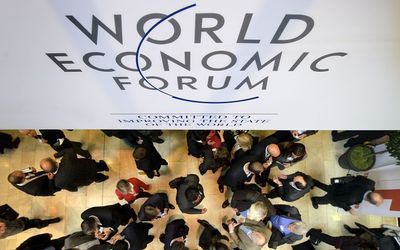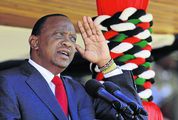Fourth wave can buoy a flailing Africa
by Joseph Senona,
2016-01-28 06:24:16.0
AS HAS become tradition, the African Union (AU) Summit convenes in the next few days to prepare for the second year of implementing Agenda 2063, the strategic framework for the socioeconomic transformation of the continent over the next 50 years.
Incidentally, January 1 also marked the official countdown to achieving the UN 2030 Agenda for Sustainable Development Goals. By all accounts, 2016 is an important year for Africa.
The AU Summit follows a fairly successful World Economic Forum that led with the theme, "Mastering the Fourth Industrial Revolution".
Whereas the official theme for the AU Summit is "African Year of Human Rights", with a particular focus on the rights of women, it can be expected to also pronounce on peace and security issues, and discuss the grim global economic outlook as well as the El Niño phenomenon and its effect on food security.
First prize will be meaningful discussion of how best to master the Fourth Industrial Revolution to shake up Africa’s industrialisation and integration programmes, as foreseen in Agenda 2063.
Listening carefully to African leaders at the Davos meetings, the emerging consensus seems to be that the key to tackling many of Africa’s systemic and structural socioeconomic challenges is exploiting new technologies and other innovation, in line with the Fourth Industrial Revolution trajectory.
The Fourth Industrial Revolution — also known as Industry 4.0 — follows the previous industrial revolutions during the Agrarian Age, Industrial Age and Information Age and represents the best of human progress in that it brings forth the most advanced and disruptive technology innovations in automation, robotics, artificial intelligence, driverless cars, big data and others.
Africa is uniquely positioned to not just catch up with the rest of the world, but leapfrog ahead by taking full advantage of the new technologies that are crucial to tackling problems in food security, climate change, energy, education, health and industry competitiveness, among others.
This means Industry 4.0 must be the leitmotif underpinning Agenda 2063, and the AU’s science, technology and innovation strategy for Africa 2024 must be implemented by all countries as a matter of priority.
In practice, the Fourth Industrial Revolution presents opportunities for Africa to move away from raw material-based economic growth.
It will significantly alter manufacturing and trade patterns and create a more diversified export basket with high technology product lines based on advanced manufacturing platforms.
The latter will disrupt traditional industrial value-addition chains, substituting them with rapid automated and crowd-sourced industrial production.
In addition, it will provide an alternate form of intra-Africa trade driven by the information and communications technology-led virtual market, based on multiple e-commerce platforms.
Eventually, Industry 4.0 will be an opportunity to revolutionise and digitise the all-important African informal economy, empowering people through access to information in the new knowledge economy.
To take full advantage will require smart thinking by African leaders, the cultivation of appropriate skills, and dexterous action to put in place the required policies, 21st century regulations and enabling infrastructure such as access to electricity, broadband and devices.
It is also an opportune time for the AU Summit to remind African states of their commitment to spend 1% of gross domestic product on research and development, especially as many countries apply austerity measures to save their economies from the economic slowdown and currency volatility.
• Senona is the official responsible for science and technology co-operation with African countries in the Department of Science and Technology. He writes in his personal capacity

World Economic Forum. Picture: AFP PHOTO / FABRICE COFFRINI
AS HAS become tradition, the African Union (AU) Summit convenes in the next few days to prepare for the second year of implementing Agenda 2063, the strategic framework for the socioeconomic transformation of the continent over the next 50 years.
Incidentally, January 1 also marked the official countdown to achieving the UN 2030 Agenda for Sustainable Development Goals. By all accounts, 2016 is an important year for Africa.
The AU Summit follows a fairly successful World Economic Forum that led with the theme, "Mastering the Fourth Industrial Revolution".
Whereas the official theme for the AU Summit is "African Year of Human Rights", with a particular focus on the rights of women, it can be expected to also pronounce on peace and security issues, and discuss the grim global economic outlook as well as the El Niño phenomenon and its effect on food security.
First prize will be meaningful discussion of how best to master the Fourth Industrial Revolution to shake up Africa’s industrialisation and integration programmes, as foreseen in Agenda 2063.
Listening carefully to African leaders at the Davos meetings, the emerging consensus seems to be that the key to tackling many of Africa’s systemic and structural socioeconomic challenges is exploiting new technologies and other innovation, in line with the Fourth Industrial Revolution trajectory.
The Fourth Industrial Revolution — also known as Industry 4.0 — follows the previous industrial revolutions during the Agrarian Age, Industrial Age and Information Age and represents the best of human progress in that it brings forth the most advanced and disruptive technology innovations in automation, robotics, artificial intelligence, driverless cars, big data and others.
Africa is uniquely positioned to not just catch up with the rest of the world, but leapfrog ahead by taking full advantage of the new technologies that are crucial to tackling problems in food security, climate change, energy, education, health and industry competitiveness, among others.
This means Industry 4.0 must be the leitmotif underpinning Agenda 2063, and the AU’s science, technology and innovation strategy for Africa 2024 must be implemented by all countries as a matter of priority.
In practice, the Fourth Industrial Revolution presents opportunities for Africa to move away from raw material-based economic growth.
It will significantly alter manufacturing and trade patterns and create a more diversified export basket with high technology product lines based on advanced manufacturing platforms.
The latter will disrupt traditional industrial value-addition chains, substituting them with rapid automated and crowd-sourced industrial production.
In addition, it will provide an alternate form of intra-Africa trade driven by the information and communications technology-led virtual market, based on multiple e-commerce platforms.
Eventually, Industry 4.0 will be an opportunity to revolutionise and digitise the all-important African informal economy, empowering people through access to information in the new knowledge economy.
To take full advantage will require smart thinking by African leaders, the cultivation of appropriate skills, and dexterous action to put in place the required policies, 21st century regulations and enabling infrastructure such as access to electricity, broadband and devices.
It is also an opportune time for the AU Summit to remind African states of their commitment to spend 1% of gross domestic product on research and development, especially as many countries apply austerity measures to save their economies from the economic slowdown and currency volatility.
• Senona is the official responsible for science and technology co-operation with African countries in the Department of Science and Technology. He writes in his personal capacity
























Change: -1.02%
Change: -1.10%
Change: -1.83%
Change: -1.03%
Change: -0.45%
Data supplied by Profile Data
Change: -1.00%
Change: -0.18%
Change: -1.01%
Change: 0.00%
Change: -0.20%
Data supplied by Profile Data
Change: 0.11%
Change: 0.14%
Change: 0.27%
Change: 0.38%
Change: 0.34%
Data supplied by Profile Data
Change: 0.04%
Change: 0.51%
Change: -0.32%
Change: 1.60%
Change: 1.24%
Data supplied by Profile Data